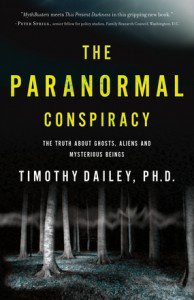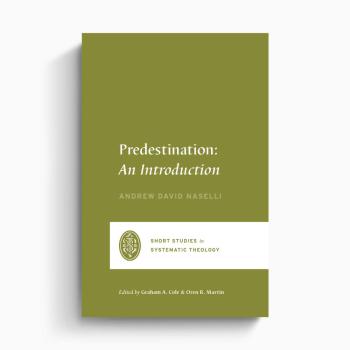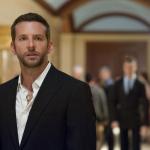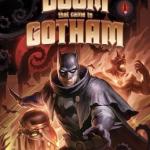Review of The Paranormal Conspiracy by Timothy J. Dailey
This review is part of the Patheos Book Club.
“The fearful abounding at this time in this country, of these detestable slaves of the Devil, the witches or enchanters, has moved me, beloved reader, to dispatch in this post, this following treatise of mine, not in any wise (as I protest) to serve for a show of my own learning and ingenuity, but only (moved by conscience) to press thereby, so far as I can, to resolve the doubting hearts of many; both that such assaults of Satan ore most certainly practiced…” King James I, Demonology. Preface.
The Bible doesn’t have much to say about demons. Or angels. Or really any manner of supernatural beings aside from the Lord Himself. Which in no way stops our contemporary culture from being fascinated with the idea that there is a world just out of sight that has a direct impact on our daily lives. Popular fiction focusing on this world of both the Christian and secular variety has become fairly mainstream. And so Timothy Dailey’s The Paranormal Conspiracy is timely and relevant. That it is well-written and interesting is just an unexpected bonus. Which is not to say that The Paranormal Conspiracy is without its problems, just that overall it is a fine read.
Dailey uses a Francis Schaeffer-esque approach to the matter (which makes it appropriate to cover on this blog). That is, instead of coming up with a systematic theology of demons—which has already been done by no lesser a personage than King James I of England—Dailey focuses on individual narratives and challenges us to dig down into the motivations and worldviews acting as foundations for these stories. What are the real goals of the various characters in these stories? What does the voice coming through the ether want us to do, and what do we want to hear? Knowing the answers to the questions enables us to see our own sinful natures, the quality of the evil powers at work in the world, and the hope offered in the Gospel. And while I do wish that Dailey had been clearer on exactly why the Gospel offers such hope, he is at least explicit that the powers of darkness have already been defeated by Christ and so have only temporary, limited power in the world. It is important to remember that we worship a God who does not promise power or secret knowledge or otherworldly experiences. These things might or might not come from a relationship with Him, but they are tangential. We worship a God who promises that the life, death, and resurrection of Jesus Christ contain all the power we need to be forgiven for our sin, all the knowledge we need of the life we should have lived and the death we should have died, and the very much this-worldly experience of peace with God that will be perfected in heaven, but which begins now. Dailey is absolutely correct to highlight that all our longings for proof of extraterrestrial life, contact from beyond the grave, or secret knowledge of arcane arts, are really only corruptions of the longing we should have for communion with God. Any book on demons that does not end there is simply not worth your time.

The Paranormal Conspiracy is also quite well written. Composed mostly of narratives about everything from hypnotism to alien abductions to Bigfoot sightings to zombie archaeology, Dailey tells these stories with style and clarity. In a time when far too many sub-standard writers are shilling their plop, it’s always nice to read someone who can string two words together well.
There are, however, a few problems with this book. First of course is the question of how appropriate it is for Christians to spend much time on the subject. As I said at the outset, the Bible really doesn’t deal much with the supernatural. There are angels and demons and occasionally other sorts of creatures of some kind of indeterminate nature, but the primary focus of Scripture is clearly on God and man. This is interesting by contrast with other ancient religious texts, including those from within the later (post-Old Testament) Jewish tradition and the pseudo-spiritual movements of the First Century AD. These Second Temple and Gnostic texts are rife with demons, angels, spirits, and other powers that can be resisted or summoned in our daily lives. The fact that the inspired Scriptures specifically do not engage these topics suggests that the attention we give to them should be pretty limited—say not much more than about a two hundred page book’s worth.
Second, while Dailey isn’t truly seeing a demon behind every rock and tree, some of the stories he shares are of pretty questionable value even if we’re being as generous as possible. Take, for example, the stories of alien abductions. Don’t get me wrong, I love me some X-Files, I am an H.P. Lovecraft devotee, and I fairly regularly check MUFON’s UFO tracker to see what people are reporting. But with any given UFO abduction claim, we should remember that there are multiple options:
1) the person making the claim is telling the truth;
2) the person making the claim is insane;
3) the person making the claim is lying.
Dailey hints that 1) might be the case, though instead of “aliens” the abductors may have been “demons” intent on sowing confusion and disinformation in the world. While I don’t know (or particularly care) whether there are aliens, and while I do believe there are demons (but don’t know much about them—or particularly care to), I suspect in most of the cases cited in The Paranormal Conspiracy Dailey was too quick to dismiss options 2) and 3). The same may be said of many of his other examples. At times, he is far too quick to spot supernatural forces where we may be seeing at least natural phenomena or most nothing more than the inherent wickedness of the human heart. Giving examples would provide spoilers, so I’ll just encourage you to read the book for yourself with a slightly more skeptical eye than Dailey has at times.
Again, don’t let these limitations keep you from reading The Paranormal Conspiracy. Overall it’s a well-written quick read that’s worth picking up.
Dr. Coyle Neal teaches Political Science at Southwest Baptist University in Bolivar, MO., where he contemplates keeping a line of salt in place at every entrance to his house.













